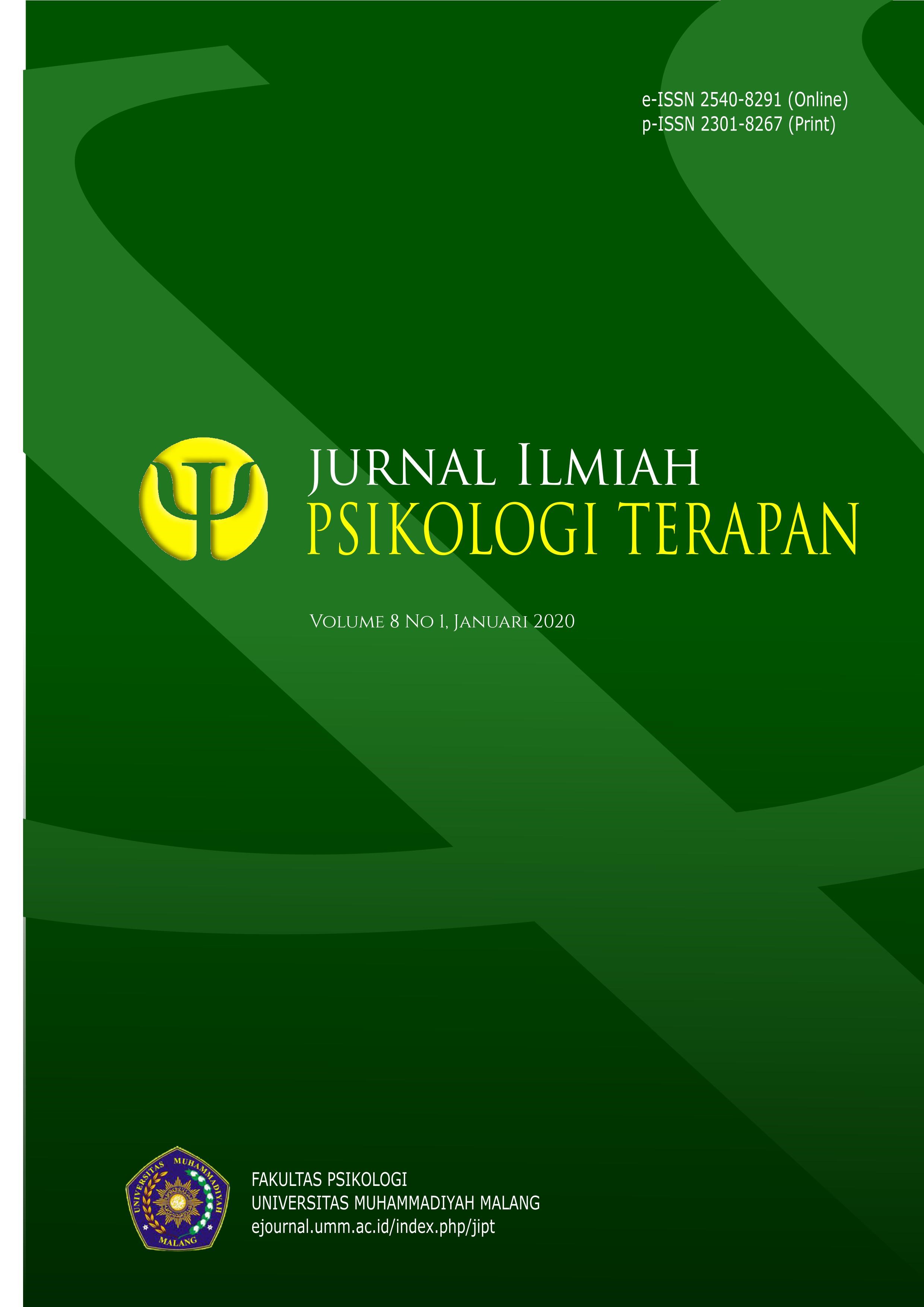Peningkatan resiliensi penyintas pelecehan seksual melalui terapi pemaafan
DOI:
https://doi.org/10.22219/jipt.v8i1.9865Keywords:
unwanted pregnancy, sexual abuse, resilience, forgiveness therapyAbstract
Objectives: An unwanted pregnancy due to sexual abuse feels so heavy for a woman so that it needs the ability to rise from adversity called resilience. Resilient individuals are able to deal with pressures in their lives and try to deal with stress through coping strategies, which is to forgive. The purpose of this study was to determine the increase in resilience in women survivors of sexual abuse who experienced an unwanted pregnancy through forgiveness therapy.
Method: This research uses quasi-experimental method with A-B reversal design. Subjects were 3 survivors of sexual abuse who experienced an unwanted pregnancy with low or moderate resilience based on the CYRM-28 scale categorization. Data were analyzed by Wilcoxon visual analysis and nonparametric analysis.
Findings: The results of visual analysis showed an increase in resilience, while the results of the nonparametric analysis showed a non-significant difference in resilience (0.109> 0.05) between before and after the intervention was given. Even so, measurement of effect size shows that forgiveness therapy has a big effect (0.926> 0.8) to increase the resilience of survivors of sexual abuse who experienced an unwanted pregnancy.
Conclusions: the research hypothesis was rejected.It means there was no effect of the application of forgiveness therapy to increase resilience in women survivors of sexual harassment who experienced an unwanted pregnancy.Downloads
References
Ariefka, Y., Sari, K., & Yulandari, N. (2018). Memaafkan pelaku perkosaan di masa
konflik: Perjalanan panjang korban konflik di Aceh. Jurnal Psikologi Unsyiah, 1(2), 58-83.
Azwar, S. (2010). Metode Penelitian. Yogyakarta: Pustaka Pelajar.
Azzahra, F. (2017). Pengaruh resiliensi terhadap distres psikologis pada
mahasiswa. Jurnal Ilmiah Psikologi Terapan, 5(1), 80-96. ISSN: 2301-8267
Dahlan, S. (2000). Hukum kesehatan: Rambu-rambu bagi profesi dokter.
Semarang: Universitas Diponegoro.
Indranata, A.D. (2018). Terapi pemaafan meningkatkan resiliensi pada keluarga
(caregiver) penderita penyakit kronis. (Thesis not published). Fakultas Psikologi dan Ilmu Sosial Budaya Universitas Islam Indonesia, Yogyakarta.
McCullough, Michael E., Root, Lindsey M., Cohen, Adam D. (2006). Writing
About the Benefits of an Interpersonal Transgression Facilitates
Forgiveness. Journal of Consulting and Clinical Psychology, 74.
Rahmandani, A., Subandi, M.A. (2010). Pengaruh terapi pemaafan dalam
meningkatkan penerimaan diri penderita kanker payudara. Jurnal
Intervensi Psikologi, 2(2).
Saim, N.J. (2013). Social support, coping, resilience and mental health in
Malaysian unwed young pregnant women and young mothers. Department of Social Work Umeå University, Sweden. ISBN: 978-91-7459-756-1.
Sari, J.S. (2018). Hubungan antara pemaafan dan resiliensi pada perempuan yang
mengalami kekerasan dalam rumah tangga. Skripsi. Yogyakarta: Fakultas
Psikologi dan Ilmu Sosial Budaya Universitas Islam Indonesia.
Siebert, A. (2005). The resiliency advantage: Master change, thrive under pressure, and bounce back from setbacks. California: Berret Koehler Publisher, Inc.
Sunanto, J.et.al. (2005). Pengantar Penelitian Dengan Subjek Tunggal. Tsukuba: CRICED University of Tsukuba.
Tugade, M. M., & Fredrickson, B. L. (2004). Resilient individuals use positive emotions to bounce back from negative emotional experiences. Journal of Personality and Social Psychology, 86, 320–333.
Ungar, M. (2012). The Social Ecology of Resilience: A Handbook of Theory and Practice. New York: Springer Science.
Walton, E. (2005). Therapeutic forgiveness: Developing a model for empowering victims of sexual abuse. Clinical Social Work Journal, 33(2), 193-207.
Yudha, I.N.B.D., & Tobing, D.H. (2017). Dinamika Memaafkan pada Korban Pelecehan Seksual. Jurnal Psikologi Udayana, 4(2), 435-447.
Downloads
Published
How to Cite
Issue
Section
License
Authors who publish with Jurnal Ilmiah Psikologi Terapan agree to the following terms:
- For all articles published in Jurnal Ilmiah Psikologi Terapan, copyright is retained by the authors. Authors give permission to the publisher to announce the work with conditions. When the manuscript is accepted for publication, the authors agree to automatic transfer of the publishing right to the publisher.
- Authors retain copyright and grant the journal right of first publication with the work simultaneously licensed under a Creative Commons Attribution-ShareAlike 4.0 International License that allows others to share the work with an acknowledgment of the work's authorship and initial publication in this journal.
- Authors are able to enter into separate, additional contractual arrangements for the non-exclusive distribution of the journal's published version of the work (e.g., post it to an institutional repository or publish it in a book), with an acknowledgment of its initial publication in this journal.
- Authors are permitted and encouraged to post their work online (e.g., in institutional repositories or on their website) prior to and during the submission process, as it can lead to productive exchanges, as well as earlier and greater citation of published work (See The Effect of Open Access).

This work is licensed under a Creative Commons Attribution-ShareAlike 4.0 International License.











